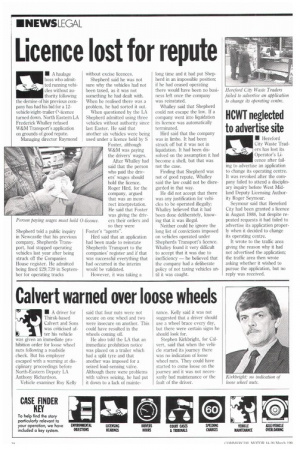Licence lost for repute
Page 20

If you've noticed an error in this article please click here to report it so we can fix it.
• A haulage boss who admitted running vehicles without authority following the demise of his previous company has had his bid for a 12vehicle/eight-trailer 0-licence turned down. North Eastern LA Frederick Whalley refused W&M Transport's application on grounds of good repute.
Managing director Raymond Shepherd told a public inquiry in Newcastle that his previous company, Shepherds Transport, had stopped operating vehicles last year after being struck off the Companies House register. He admitted being fined £29,720 in Septeniber for operating trucks without excise licences.
Shepherd said he was not sure why the vehicles had not been taxed, as it was not something he had dealt with. When he realised there was a problem, he had sorted it out.
When questioned by the LA Shepherd admitted using three vehicles without authority since last Easter. He said that another six vehicles were being used under a licence held by S Foster, although W&M was paying the drivers' wages.
After Whalley had said that the person who paid the drivers' wages should hold the licence, Roger Hird, for the company, argued that was an incorrect interpretation. He said that Foster was giving the drivers their orders and so they were Fosters "agents".
Hird said that an application had been made to reinstate Shepherds Transport to the companies' register and if that was successful everything that had occurred in the interim would be validated.
However, it was taking a long time and it had put Shepherd in an impossible position; if he had ceased operating there would have been no business left once the company was reinstated.
Whalley said that Shepherd could not escape the law. If a company went into liquidation its licence was automatically terminated.
Hird said that the company was in limbo. It had been struck off but it was not in liquidation. It had been dissolved on the assumption it had become a shell, but that was not the case.
Finding that Shepherd was not of good repute, Whalley said the law could not be disregarded in that way.
He did not accept that there was any justification for vehicles to be operated illegally; Whalley believed that it had been done deliberately, knowing that it was illegal.
Neither could he ignore the long list of convictions imposed on vehicles operated under Shepherds Transport's licence. Whalley found it very difficult to accept that it was due to inefficiency — he believed that the company had a deliberate policy of not taxing vehicles until it was caught.




















































































